Effective Management in the Hospitality Industry: A Detailed Analysis
VerifiedAdded on 2023/06/08
|6
|1252
|413
Essay
AI Summary
This essay provides a comprehensive analysis of effective management within the hospitality industry. It begins by identifying visionary leaders like Conrad Hilton and examining their effective strategies. The essay then delves into content theories of motivation, explaining how managers can use these theories to motivate employees in the hospitality sector. Furthermore, it addresses individual barriers to creative thinking, such as resistance to change and the inability to tolerate ambiguity, and suggests strategies for managers to overcome these challenges. The analysis draws on academic research and real-world examples to illustrate the key concepts and their practical applications. The essay aims to provide insights into how to foster a successful and innovative environment within the dynamic hospitality industry.
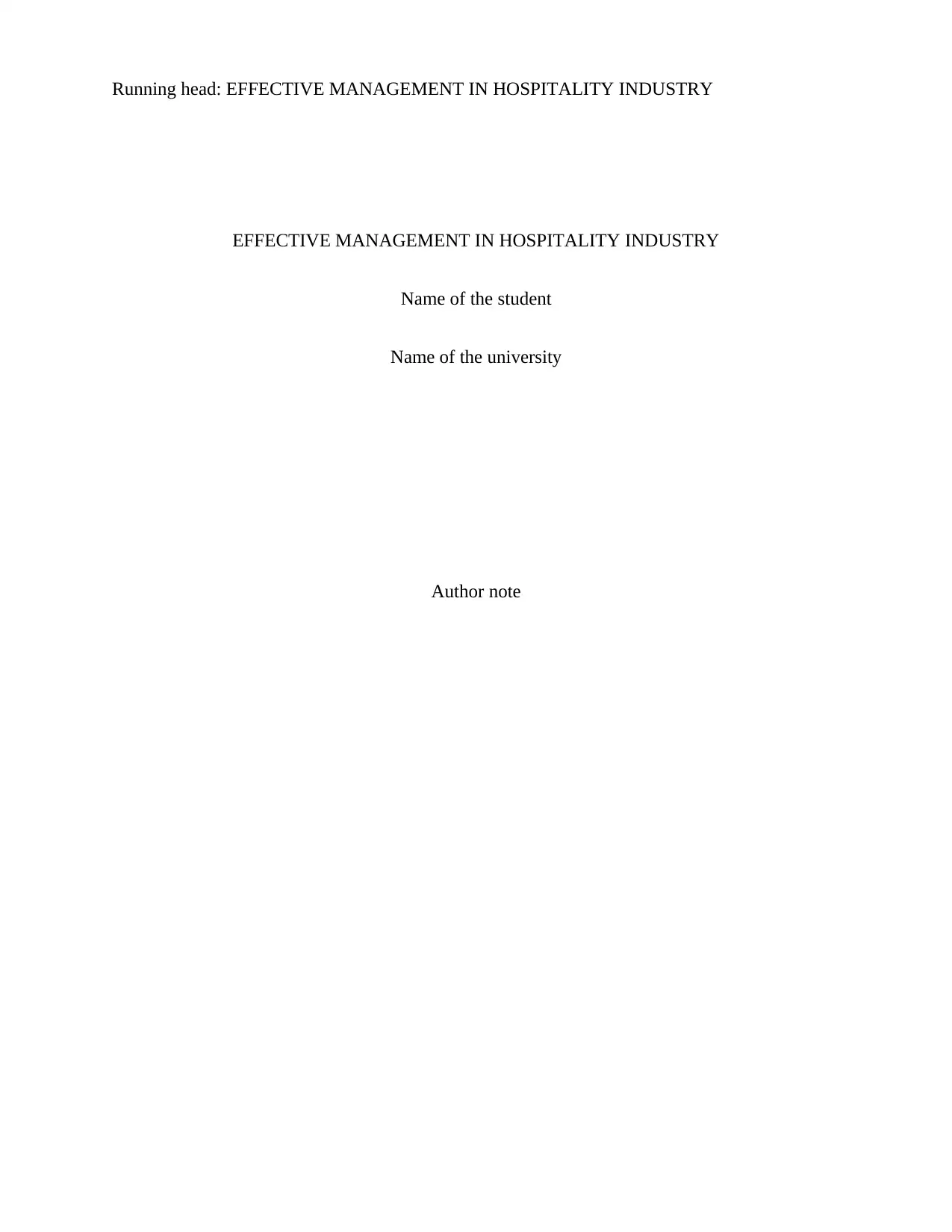
Running head: EFFECTIVE MANAGEMENT IN HOSPITALITY INDUSTRY
EFFECTIVE MANAGEMENT IN HOSPITALITY INDUSTRY
Name of the student
Name of the university
Author note
EFFECTIVE MANAGEMENT IN HOSPITALITY INDUSTRY
Name of the student
Name of the university
Author note
Paraphrase This Document
Need a fresh take? Get an instant paraphrase of this document with our AI Paraphraser
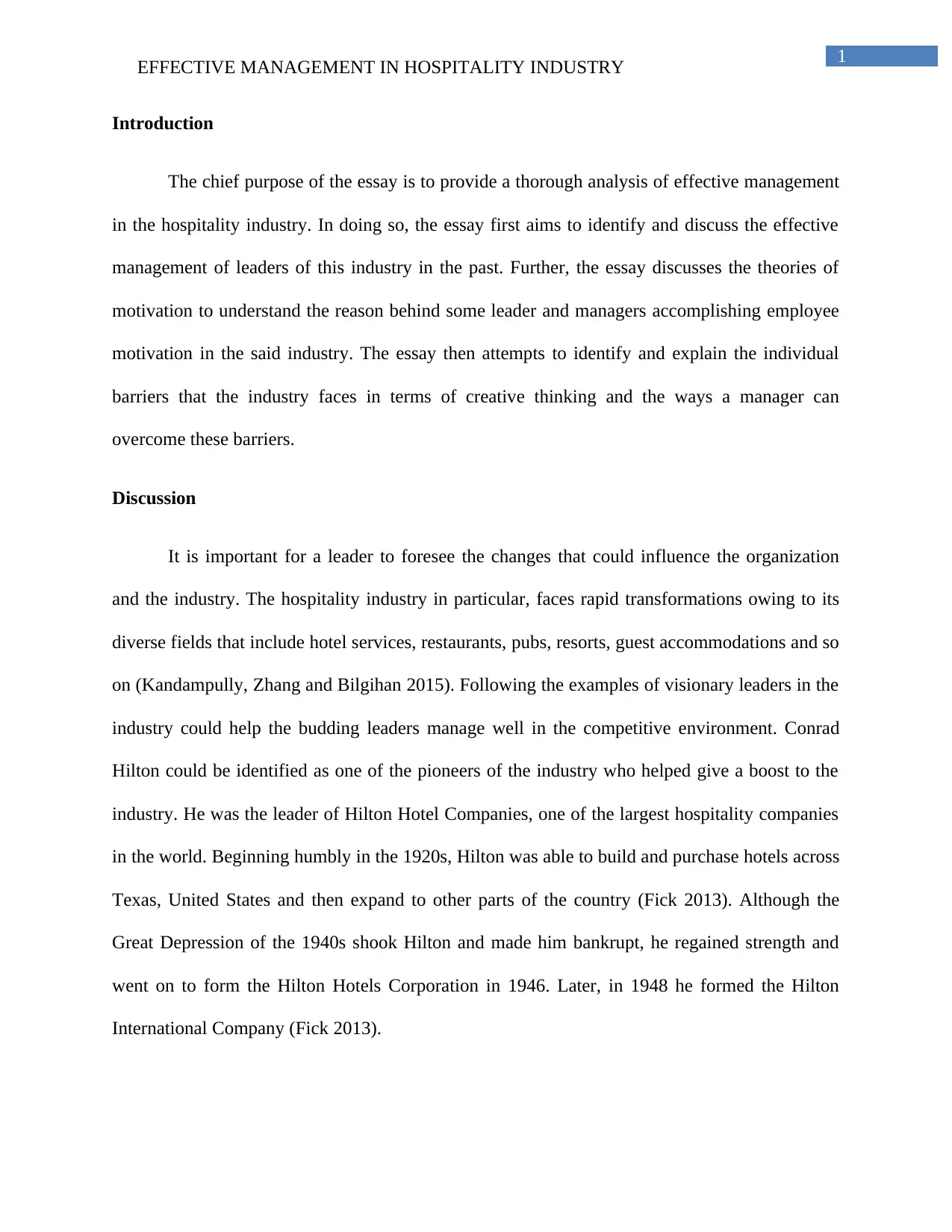
1
EFFECTIVE MANAGEMENT IN HOSPITALITY INDUSTRY
Introduction
The chief purpose of the essay is to provide a thorough analysis of effective management
in the hospitality industry. In doing so, the essay first aims to identify and discuss the effective
management of leaders of this industry in the past. Further, the essay discusses the theories of
motivation to understand the reason behind some leader and managers accomplishing employee
motivation in the said industry. The essay then attempts to identify and explain the individual
barriers that the industry faces in terms of creative thinking and the ways a manager can
overcome these barriers.
Discussion
It is important for a leader to foresee the changes that could influence the organization
and the industry. The hospitality industry in particular, faces rapid transformations owing to its
diverse fields that include hotel services, restaurants, pubs, resorts, guest accommodations and so
on (Kandampully, Zhang and Bilgihan 2015). Following the examples of visionary leaders in the
industry could help the budding leaders manage well in the competitive environment. Conrad
Hilton could be identified as one of the pioneers of the industry who helped give a boost to the
industry. He was the leader of Hilton Hotel Companies, one of the largest hospitality companies
in the world. Beginning humbly in the 1920s, Hilton was able to build and purchase hotels across
Texas, United States and then expand to other parts of the country (Fick 2013). Although the
Great Depression of the 1940s shook Hilton and made him bankrupt, he regained strength and
went on to form the Hilton Hotels Corporation in 1946. Later, in 1948 he formed the Hilton
International Company (Fick 2013).
EFFECTIVE MANAGEMENT IN HOSPITALITY INDUSTRY
Introduction
The chief purpose of the essay is to provide a thorough analysis of effective management
in the hospitality industry. In doing so, the essay first aims to identify and discuss the effective
management of leaders of this industry in the past. Further, the essay discusses the theories of
motivation to understand the reason behind some leader and managers accomplishing employee
motivation in the said industry. The essay then attempts to identify and explain the individual
barriers that the industry faces in terms of creative thinking and the ways a manager can
overcome these barriers.
Discussion
It is important for a leader to foresee the changes that could influence the organization
and the industry. The hospitality industry in particular, faces rapid transformations owing to its
diverse fields that include hotel services, restaurants, pubs, resorts, guest accommodations and so
on (Kandampully, Zhang and Bilgihan 2015). Following the examples of visionary leaders in the
industry could help the budding leaders manage well in the competitive environment. Conrad
Hilton could be identified as one of the pioneers of the industry who helped give a boost to the
industry. He was the leader of Hilton Hotel Companies, one of the largest hospitality companies
in the world. Beginning humbly in the 1920s, Hilton was able to build and purchase hotels across
Texas, United States and then expand to other parts of the country (Fick 2013). Although the
Great Depression of the 1940s shook Hilton and made him bankrupt, he regained strength and
went on to form the Hilton Hotels Corporation in 1946. Later, in 1948 he formed the Hilton
International Company (Fick 2013).
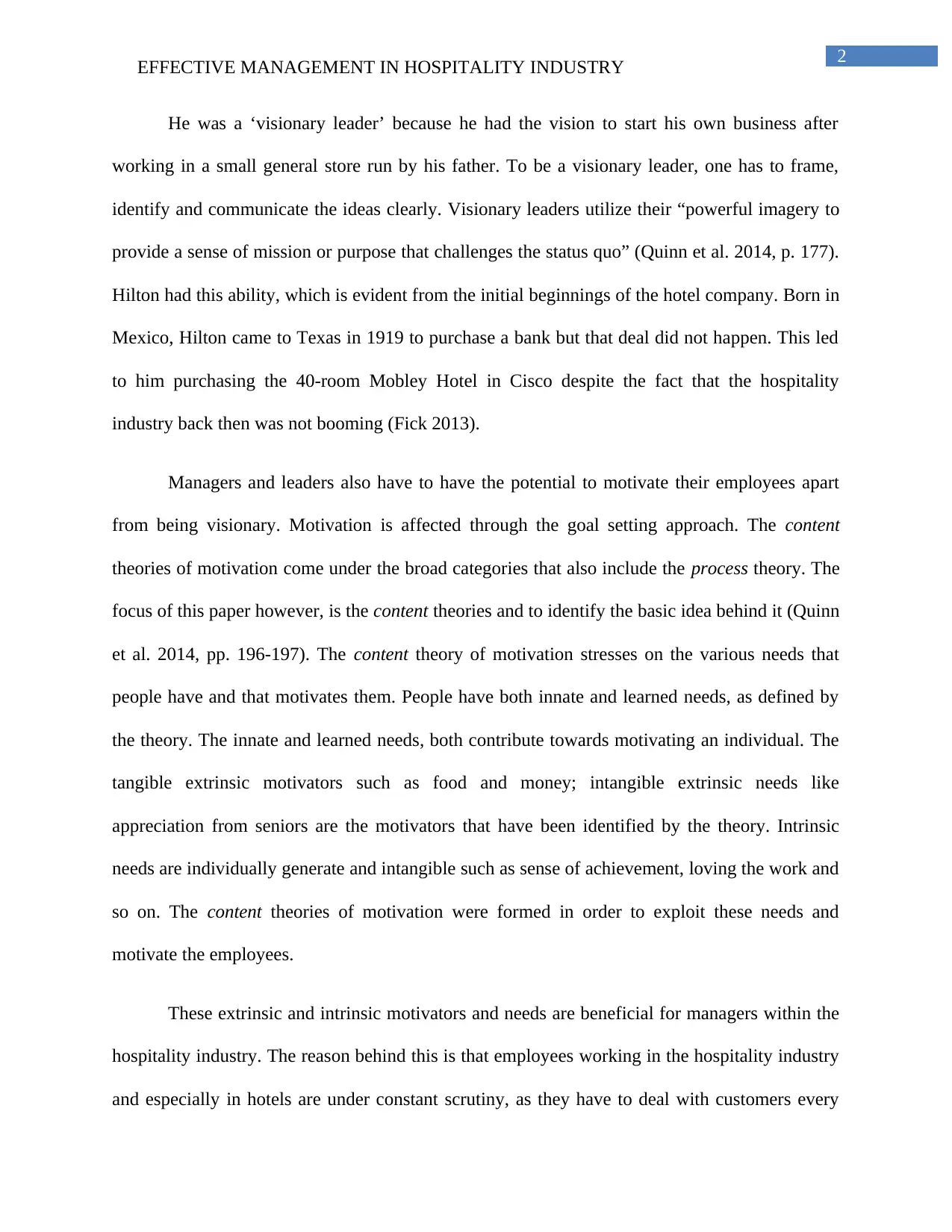
2
EFFECTIVE MANAGEMENT IN HOSPITALITY INDUSTRY
He was a ‘visionary leader’ because he had the vision to start his own business after
working in a small general store run by his father. To be a visionary leader, one has to frame,
identify and communicate the ideas clearly. Visionary leaders utilize their “powerful imagery to
provide a sense of mission or purpose that challenges the status quo” (Quinn et al. 2014, p. 177).
Hilton had this ability, which is evident from the initial beginnings of the hotel company. Born in
Mexico, Hilton came to Texas in 1919 to purchase a bank but that deal did not happen. This led
to him purchasing the 40-room Mobley Hotel in Cisco despite the fact that the hospitality
industry back then was not booming (Fick 2013).
Managers and leaders also have to have the potential to motivate their employees apart
from being visionary. Motivation is affected through the goal setting approach. The content
theories of motivation come under the broad categories that also include the process theory. The
focus of this paper however, is the content theories and to identify the basic idea behind it (Quinn
et al. 2014, pp. 196-197). The content theory of motivation stresses on the various needs that
people have and that motivates them. People have both innate and learned needs, as defined by
the theory. The innate and learned needs, both contribute towards motivating an individual. The
tangible extrinsic motivators such as food and money; intangible extrinsic needs like
appreciation from seniors are the motivators that have been identified by the theory. Intrinsic
needs are individually generate and intangible such as sense of achievement, loving the work and
so on. The content theories of motivation were formed in order to exploit these needs and
motivate the employees.
These extrinsic and intrinsic motivators and needs are beneficial for managers within the
hospitality industry. The reason behind this is that employees working in the hospitality industry
and especially in hotels are under constant scrutiny, as they have to deal with customers every
EFFECTIVE MANAGEMENT IN HOSPITALITY INDUSTRY
He was a ‘visionary leader’ because he had the vision to start his own business after
working in a small general store run by his father. To be a visionary leader, one has to frame,
identify and communicate the ideas clearly. Visionary leaders utilize their “powerful imagery to
provide a sense of mission or purpose that challenges the status quo” (Quinn et al. 2014, p. 177).
Hilton had this ability, which is evident from the initial beginnings of the hotel company. Born in
Mexico, Hilton came to Texas in 1919 to purchase a bank but that deal did not happen. This led
to him purchasing the 40-room Mobley Hotel in Cisco despite the fact that the hospitality
industry back then was not booming (Fick 2013).
Managers and leaders also have to have the potential to motivate their employees apart
from being visionary. Motivation is affected through the goal setting approach. The content
theories of motivation come under the broad categories that also include the process theory. The
focus of this paper however, is the content theories and to identify the basic idea behind it (Quinn
et al. 2014, pp. 196-197). The content theory of motivation stresses on the various needs that
people have and that motivates them. People have both innate and learned needs, as defined by
the theory. The innate and learned needs, both contribute towards motivating an individual. The
tangible extrinsic motivators such as food and money; intangible extrinsic needs like
appreciation from seniors are the motivators that have been identified by the theory. Intrinsic
needs are individually generate and intangible such as sense of achievement, loving the work and
so on. The content theories of motivation were formed in order to exploit these needs and
motivate the employees.
These extrinsic and intrinsic motivators and needs are beneficial for managers within the
hospitality industry. The reason behind this is that employees working in the hospitality industry
and especially in hotels are under constant scrutiny, as they have to deal with customers every
⊘ This is a preview!⊘
Do you want full access?
Subscribe today to unlock all pages.

Trusted by 1+ million students worldwide
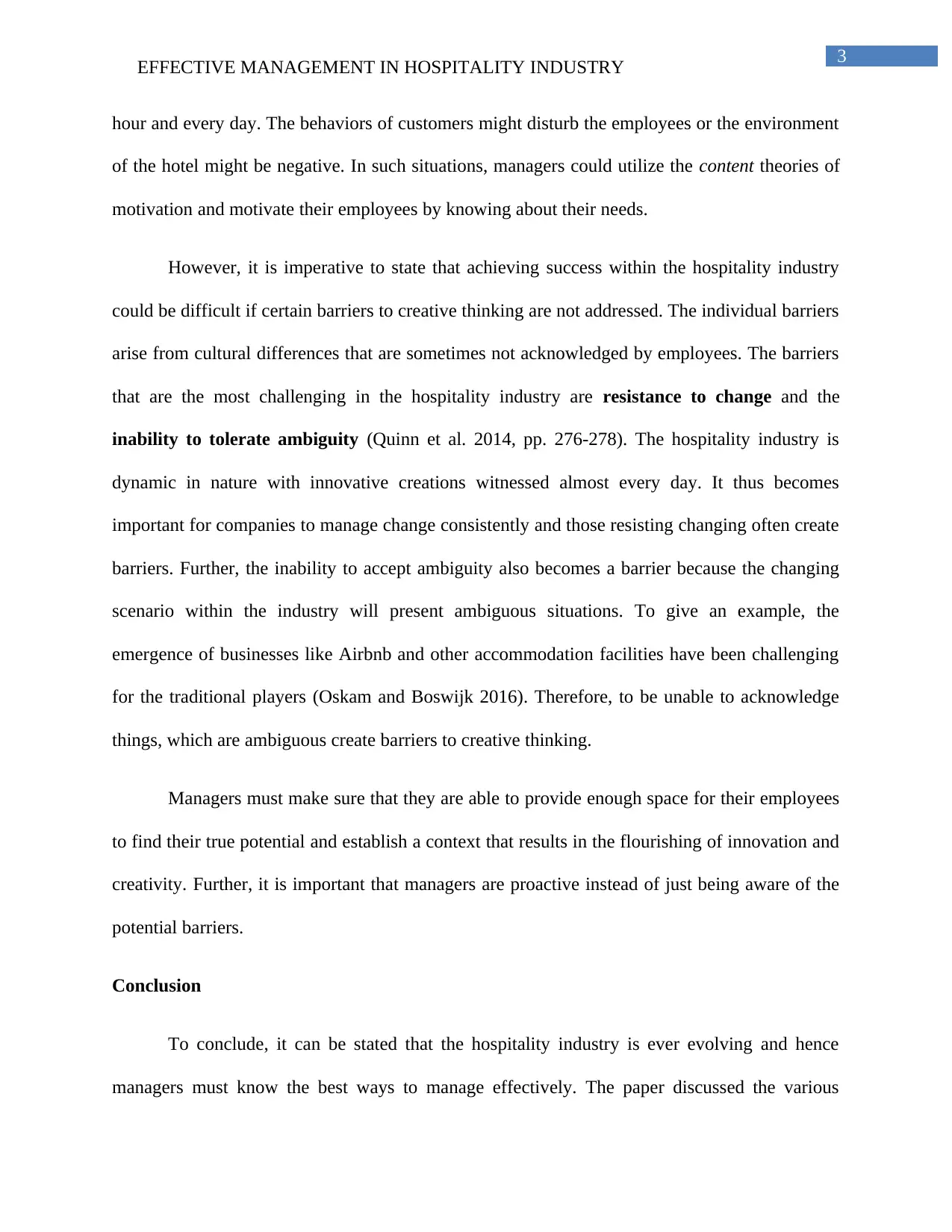
3
EFFECTIVE MANAGEMENT IN HOSPITALITY INDUSTRY
hour and every day. The behaviors of customers might disturb the employees or the environment
of the hotel might be negative. In such situations, managers could utilize the content theories of
motivation and motivate their employees by knowing about their needs.
However, it is imperative to state that achieving success within the hospitality industry
could be difficult if certain barriers to creative thinking are not addressed. The individual barriers
arise from cultural differences that are sometimes not acknowledged by employees. The barriers
that are the most challenging in the hospitality industry are resistance to change and the
inability to tolerate ambiguity (Quinn et al. 2014, pp. 276-278). The hospitality industry is
dynamic in nature with innovative creations witnessed almost every day. It thus becomes
important for companies to manage change consistently and those resisting changing often create
barriers. Further, the inability to accept ambiguity also becomes a barrier because the changing
scenario within the industry will present ambiguous situations. To give an example, the
emergence of businesses like Airbnb and other accommodation facilities have been challenging
for the traditional players (Oskam and Boswijk 2016). Therefore, to be unable to acknowledge
things, which are ambiguous create barriers to creative thinking.
Managers must make sure that they are able to provide enough space for their employees
to find their true potential and establish a context that results in the flourishing of innovation and
creativity. Further, it is important that managers are proactive instead of just being aware of the
potential barriers.
Conclusion
To conclude, it can be stated that the hospitality industry is ever evolving and hence
managers must know the best ways to manage effectively. The paper discussed the various
EFFECTIVE MANAGEMENT IN HOSPITALITY INDUSTRY
hour and every day. The behaviors of customers might disturb the employees or the environment
of the hotel might be negative. In such situations, managers could utilize the content theories of
motivation and motivate their employees by knowing about their needs.
However, it is imperative to state that achieving success within the hospitality industry
could be difficult if certain barriers to creative thinking are not addressed. The individual barriers
arise from cultural differences that are sometimes not acknowledged by employees. The barriers
that are the most challenging in the hospitality industry are resistance to change and the
inability to tolerate ambiguity (Quinn et al. 2014, pp. 276-278). The hospitality industry is
dynamic in nature with innovative creations witnessed almost every day. It thus becomes
important for companies to manage change consistently and those resisting changing often create
barriers. Further, the inability to accept ambiguity also becomes a barrier because the changing
scenario within the industry will present ambiguous situations. To give an example, the
emergence of businesses like Airbnb and other accommodation facilities have been challenging
for the traditional players (Oskam and Boswijk 2016). Therefore, to be unable to acknowledge
things, which are ambiguous create barriers to creative thinking.
Managers must make sure that they are able to provide enough space for their employees
to find their true potential and establish a context that results in the flourishing of innovation and
creativity. Further, it is important that managers are proactive instead of just being aware of the
potential barriers.
Conclusion
To conclude, it can be stated that the hospitality industry is ever evolving and hence
managers must know the best ways to manage effectively. The paper discussed the various
Paraphrase This Document
Need a fresh take? Get an instant paraphrase of this document with our AI Paraphraser
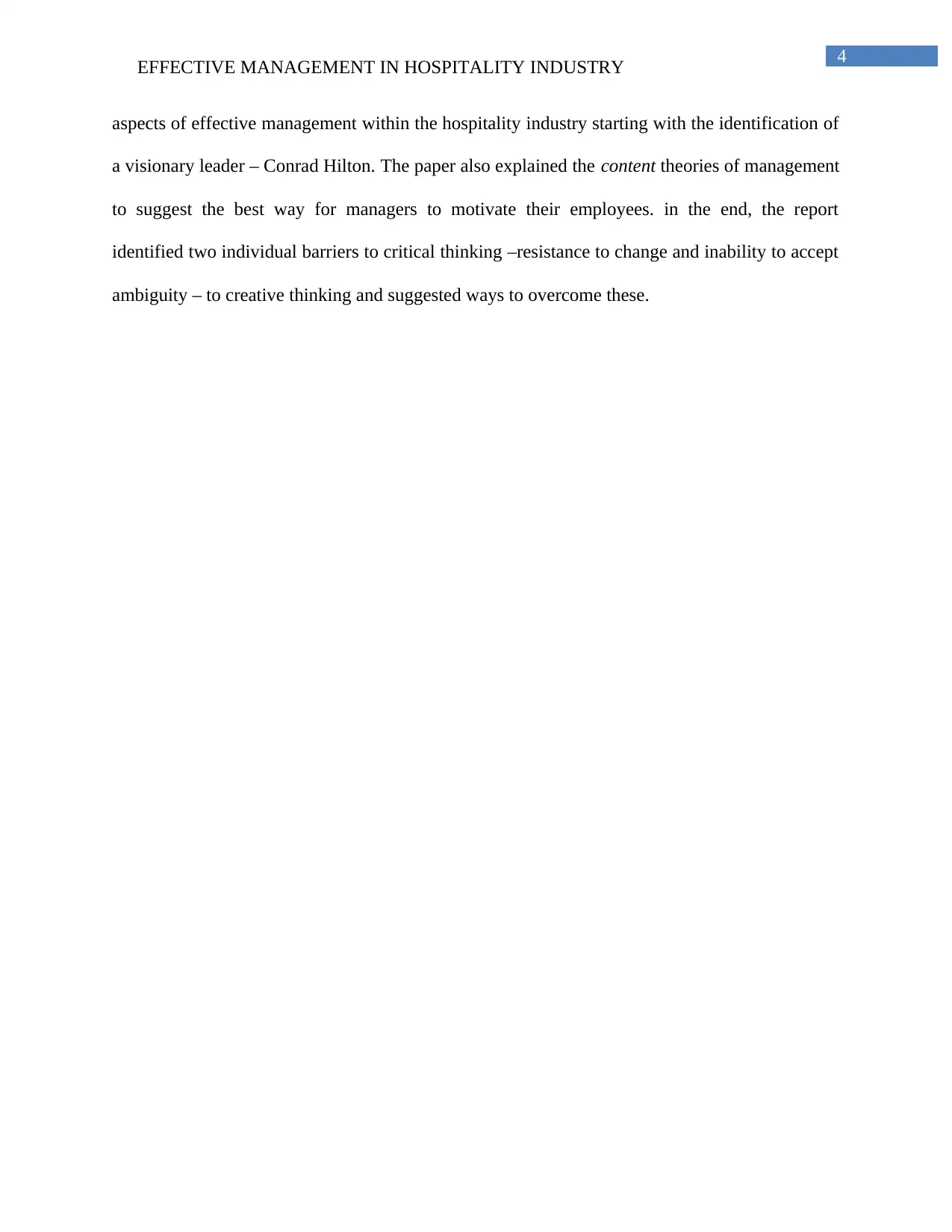
4
EFFECTIVE MANAGEMENT IN HOSPITALITY INDUSTRY
aspects of effective management within the hospitality industry starting with the identification of
a visionary leader – Conrad Hilton. The paper also explained the content theories of management
to suggest the best way for managers to motivate their employees. in the end, the report
identified two individual barriers to critical thinking –resistance to change and inability to accept
ambiguity – to creative thinking and suggested ways to overcome these.
EFFECTIVE MANAGEMENT IN HOSPITALITY INDUSTRY
aspects of effective management within the hospitality industry starting with the identification of
a visionary leader – Conrad Hilton. The paper also explained the content theories of management
to suggest the best way for managers to motivate their employees. in the end, the report
identified two individual barriers to critical thinking –resistance to change and inability to accept
ambiguity – to creative thinking and suggested ways to overcome these.
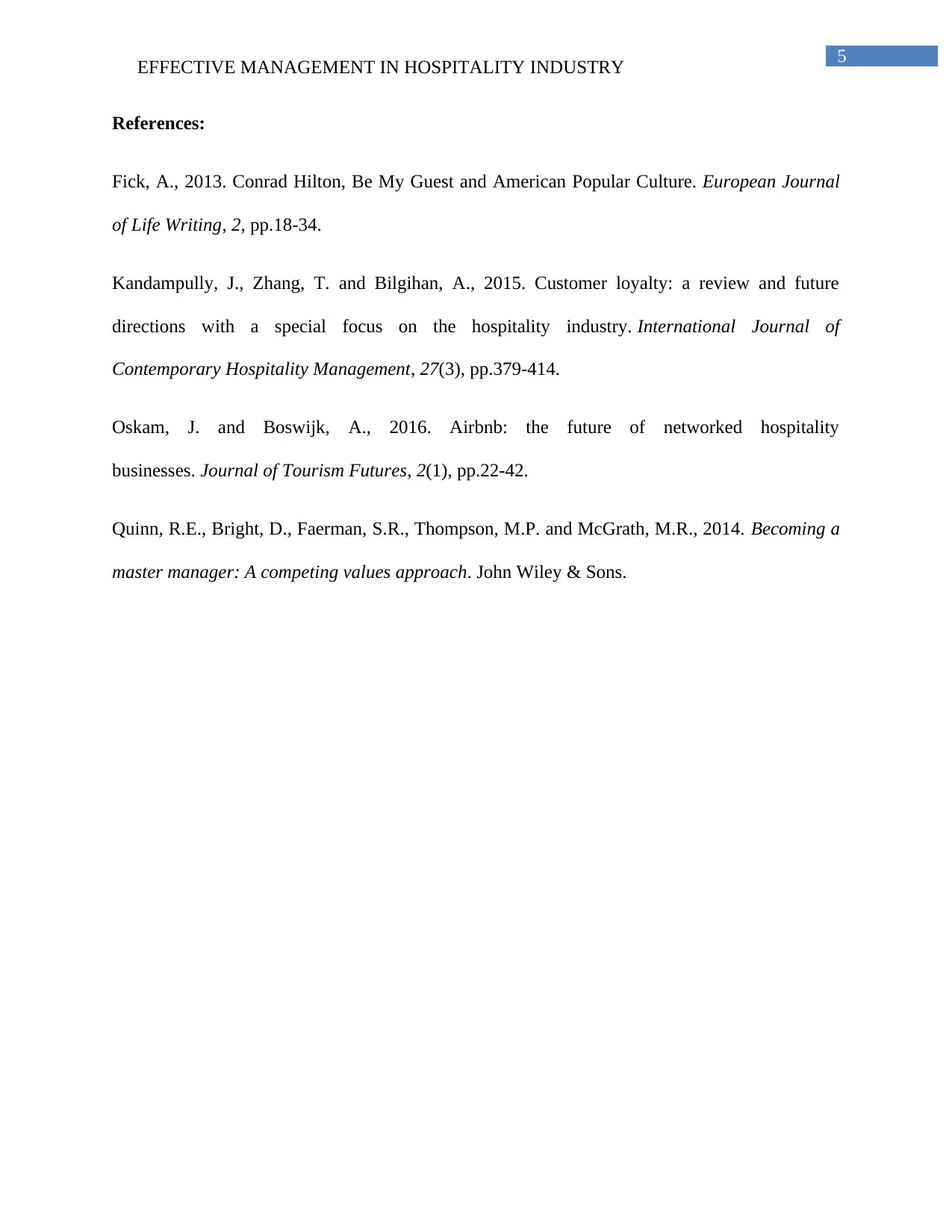
5
EFFECTIVE MANAGEMENT IN HOSPITALITY INDUSTRY
References:
Fick, A., 2013. Conrad Hilton, Be My Guest and American Popular Culture. European Journal
of Life Writing, 2, pp.18-34.
Kandampully, J., Zhang, T. and Bilgihan, A., 2015. Customer loyalty: a review and future
directions with a special focus on the hospitality industry. International Journal of
Contemporary Hospitality Management, 27(3), pp.379-414.
Oskam, J. and Boswijk, A., 2016. Airbnb: the future of networked hospitality
businesses. Journal of Tourism Futures, 2(1), pp.22-42.
Quinn, R.E., Bright, D., Faerman, S.R., Thompson, M.P. and McGrath, M.R., 2014. Becoming a
master manager: A competing values approach. John Wiley & Sons.
EFFECTIVE MANAGEMENT IN HOSPITALITY INDUSTRY
References:
Fick, A., 2013. Conrad Hilton, Be My Guest and American Popular Culture. European Journal
of Life Writing, 2, pp.18-34.
Kandampully, J., Zhang, T. and Bilgihan, A., 2015. Customer loyalty: a review and future
directions with a special focus on the hospitality industry. International Journal of
Contemporary Hospitality Management, 27(3), pp.379-414.
Oskam, J. and Boswijk, A., 2016. Airbnb: the future of networked hospitality
businesses. Journal of Tourism Futures, 2(1), pp.22-42.
Quinn, R.E., Bright, D., Faerman, S.R., Thompson, M.P. and McGrath, M.R., 2014. Becoming a
master manager: A competing values approach. John Wiley & Sons.
⊘ This is a preview!⊘
Do you want full access?
Subscribe today to unlock all pages.

Trusted by 1+ million students worldwide
1 out of 6
Related Documents
Your All-in-One AI-Powered Toolkit for Academic Success.
+13062052269
info@desklib.com
Available 24*7 on WhatsApp / Email
![[object Object]](/_next/static/media/star-bottom.7253800d.svg)
Unlock your academic potential
Copyright © 2020–2025 A2Z Services. All Rights Reserved. Developed and managed by ZUCOL.





